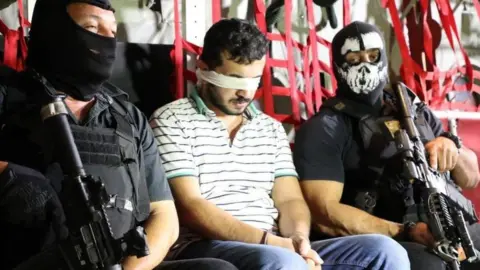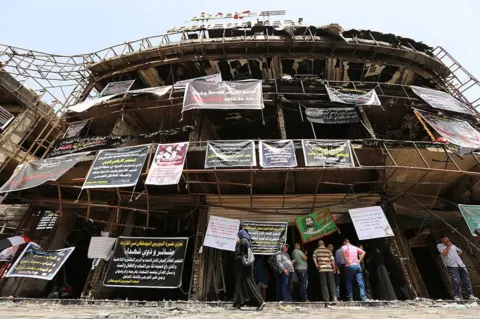Mastermind of deadly 2016 Baghdad bombing caught, Iraq says
 Yehia Rasool
Yehia RasoolIraq has detained the Islamic State militant who masterminded a suicide bombing in Baghdad in 2016 that killed 300 people, its prime minister says.
Ghazwan al-Zawbaee was captured in an "intelligence operation outside the country", Mustafa al-Kadhimi announced.
He accused the Iraqi national of being the "primary culprit behind the Karrada atrocity and many others".
The attack in the Karrada district was the deadliest single bombing in Iraq since the US-led invasion in 2003.
A lorry filled with explosives was blown up next to a crowded shopping centre where people had been enjoying a night out after breaking their daily fasts for the Islamic holy month of Ramadan. Many of the victims were killed by a fire that ripped through the building after the bomb blast.
"Bringing those complicit in the shedding of our people's blood is a national duty," Mr Kadhimi declared in the statement announcing Mr Zawbaee's arrest.
The prime minister did not say where he was captured, but two Iraqi intelligence officials told the Associated Press that the operation was carried out by Iraqi forces with the co-operation of an unnamed neighbouring country, and that he was transported to Iraq two days ago.
The spokesman for the Iraqi security forces, Gen Yehia Rasool, tweeted photographs that showed a blindfolded man sitting next to two armed guards on a military transport aircraft.
The general alleged that as well as overseeing the Karrada attack, Mr Zawbaee was behind a string of other deadly bombings in Baghdad and other provinces in 2016 and 2017.
 AFP
AFPThey included two car bomb attacks on 30 May 2017 that targeted an ice cream parlour in Karrada and a group of Shia Muslim pilgrims on a bridge in the Shawaka area, killing 26 people, he said.
Last Monday, Mr Kadhimi said intelligence agents had arrested the alleged IS financial chief, Sami Jasim al-Jaburi, in a similar operation outside its borders.
Security sources later told Reuters news agency that Mr Jasim, who was also said to have been a deputy to late IS leader Abu Bakr al-Baghdadi, was hiding out in north-western Syria and that Turkish intelligence helped capture him.
IS once controlled 88,000 sq km (34,000 sq miles) of territory stretching from eastern Iraq to western Syria and imposed its brutal rule on almost eight million people.
Despite the group's defeat on the battlefield in Iraq in 2017 and in Syria two years later, it is estimated that thousands of militants remain active in both countries.
Cells continue to wage a low-level insurgency in Iraq, operating mainly in rural areas and carrying out hit-and-run attacks that often target security forces and infrastructure.
